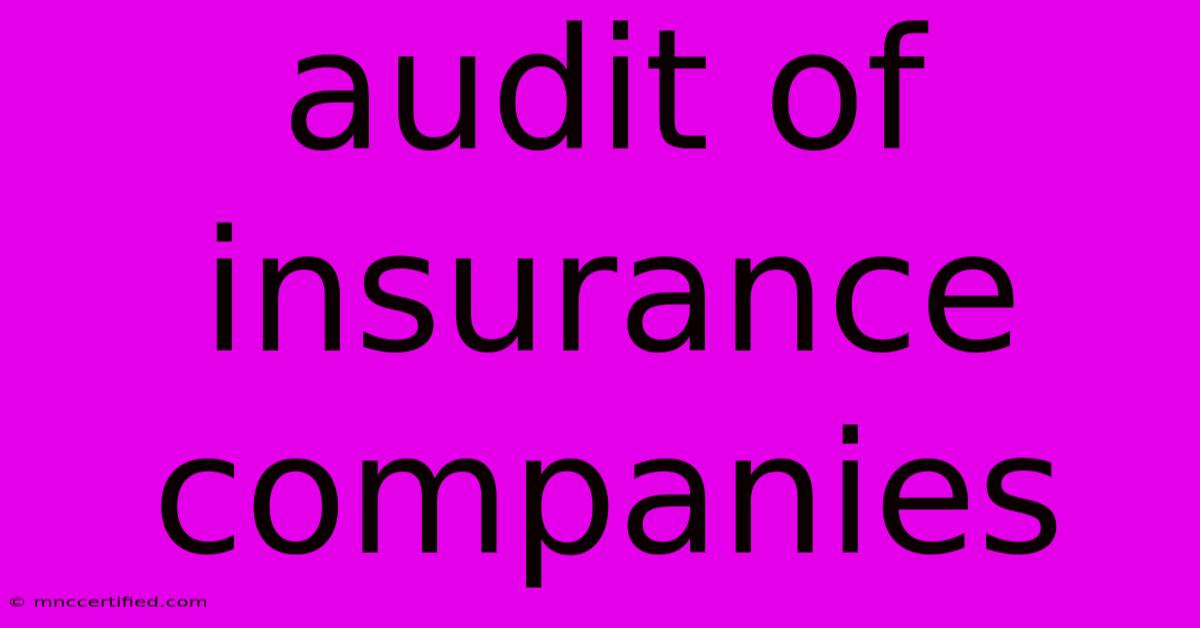Audit Of Insurance Companies

Table of Contents
The Comprehensive Guide to Insurance Company Audits
An insurance company audit is a critical process ensuring financial stability, regulatory compliance, and operational efficiency. This detailed guide explores the various facets of insurance company audits, from their purpose and types to the key players involved and the potential benefits. Understanding these aspects is crucial for both insurers and those who regulate them.
Why are Insurance Company Audits Necessary?
Insurance companies operate in a highly regulated environment, handling vast sums of money and managing significant risk. Regular audits are essential for several key reasons:
-
Regulatory Compliance: Insurers must adhere to strict regulations regarding solvency, reserving, and reporting. Audits verify compliance with these regulations, mitigating potential penalties and legal repercussions. This includes adherence to standards set by bodies like the NAIC (National Association of Insurance Commissioners) in the US, or equivalent regulatory bodies in other countries.
-
Financial Stability: Audits provide an independent assessment of an insurer's financial health. They identify potential weaknesses, ensuring the company can meet its obligations to policyholders and maintain financial stability. This is particularly vital in assessing the adequacy of reserves held against potential future claims.
-
Operational Efficiency: A thorough audit can uncover inefficiencies in processes, leading to cost savings and improved operational effectiveness. Identifying areas for improvement can strengthen the company's overall performance.
-
Fraud Detection: Audits play a critical role in detecting and preventing fraudulent activities. They provide an independent verification of transactions and financial records, minimizing the risk of financial losses.
-
Investor Confidence: For publicly traded insurance companies, a clean audit report instills confidence in investors, contributing to a positive market valuation. Independent verification of financial data is crucial for attracting and retaining investment.
Types of Insurance Company Audits
Several types of audits can be performed on insurance companies, each serving a unique purpose:
1. Financial Statement Audits:
These are the most common type, focusing on the accuracy and fairness of the insurer's financial statements. They verify that financial reporting adheres to Generally Accepted Accounting Principles (GAAP) or International Financial Reporting Standards (IFRS), depending on the jurisdiction. Key aspects examined include revenue recognition, expense allocation, and reserve adequacy.
2. Operational Audits:
These audits evaluate the effectiveness and efficiency of an insurer's operations. They assess internal controls, processes, and procedures, identifying areas for improvement in efficiency and risk management. Examples include evaluating claims processing times, underwriting practices, and customer service.
3. Compliance Audits:
These audits specifically focus on verifying adherence to relevant regulations and laws. They ensure the company meets all legal requirements, including those related to data privacy, anti-money laundering (AML), and Know Your Customer (KYC) regulations.
4. Internal Audits:
These are conducted by the insurer's internal audit department, providing an ongoing assessment of controls and processes. They often identify potential problems before they escalate into major issues, improving risk management.
Key Players in Insurance Company Audits
Several key players are involved in the audit process:
-
The Audit Committee: An independent board committee overseeing the audit process, ensuring its objectivity and integrity.
-
External Auditors: Independent accounting firms with expertise in the insurance industry perform the audit, issuing an independent opinion on the financial statements.
-
Internal Auditors: The insurer's internal audit team plays a crucial role in identifying potential issues and supporting the external audit.
-
Management: The insurance company's management team is responsible for providing information and collaborating with the auditors.
-
Regulators: Regulatory bodies oversee the audit process and ensure compliance with relevant regulations.
Benefits of a Thorough Insurance Company Audit
A comprehensive and well-executed audit offers numerous benefits:
-
Improved Risk Management: Identifying and mitigating potential risks, enhancing the insurer's overall stability.
-
Enhanced Regulatory Compliance: Avoiding penalties and legal issues associated with non-compliance.
-
Increased Efficiency and Cost Savings: Optimizing operations and reducing unnecessary expenses.
-
Stronger Investor Confidence: Building trust and attracting investment.
-
Improved Reputation: Demonstrating a commitment to transparency and accountability.
Conclusion: The Importance of Regular Audits
Regular and thorough audits are essential for the long-term health and stability of insurance companies. By ensuring compliance, identifying operational inefficiencies, and mitigating risks, audits play a vital role in maintaining the integrity and reliability of the insurance industry. Understanding the various types of audits and the key players involved is crucial for anyone involved in the insurance sector, from insurers themselves to regulators and investors. The benefits far outweigh the costs, contributing to a stronger and more resilient insurance market.

Thank you for visiting our website wich cover about Audit Of Insurance Companies. We hope the information provided has been useful to you. Feel free to contact us if you have any questions or need further assistance. See you next time and dont miss to bookmark.
Featured Posts
-
Jakorian Bennett Injury Ir Move Confirmed
Nov 30, 2024
-
How Does A Probate Bond Work
Nov 30, 2024
-
Transport Secretary Haigh Resigns After Phone Admission
Nov 30, 2024
-
Bond For Grand Larceny In Sc
Nov 30, 2024
-
Ex My Chemical Romance Member Passes
Nov 30, 2024